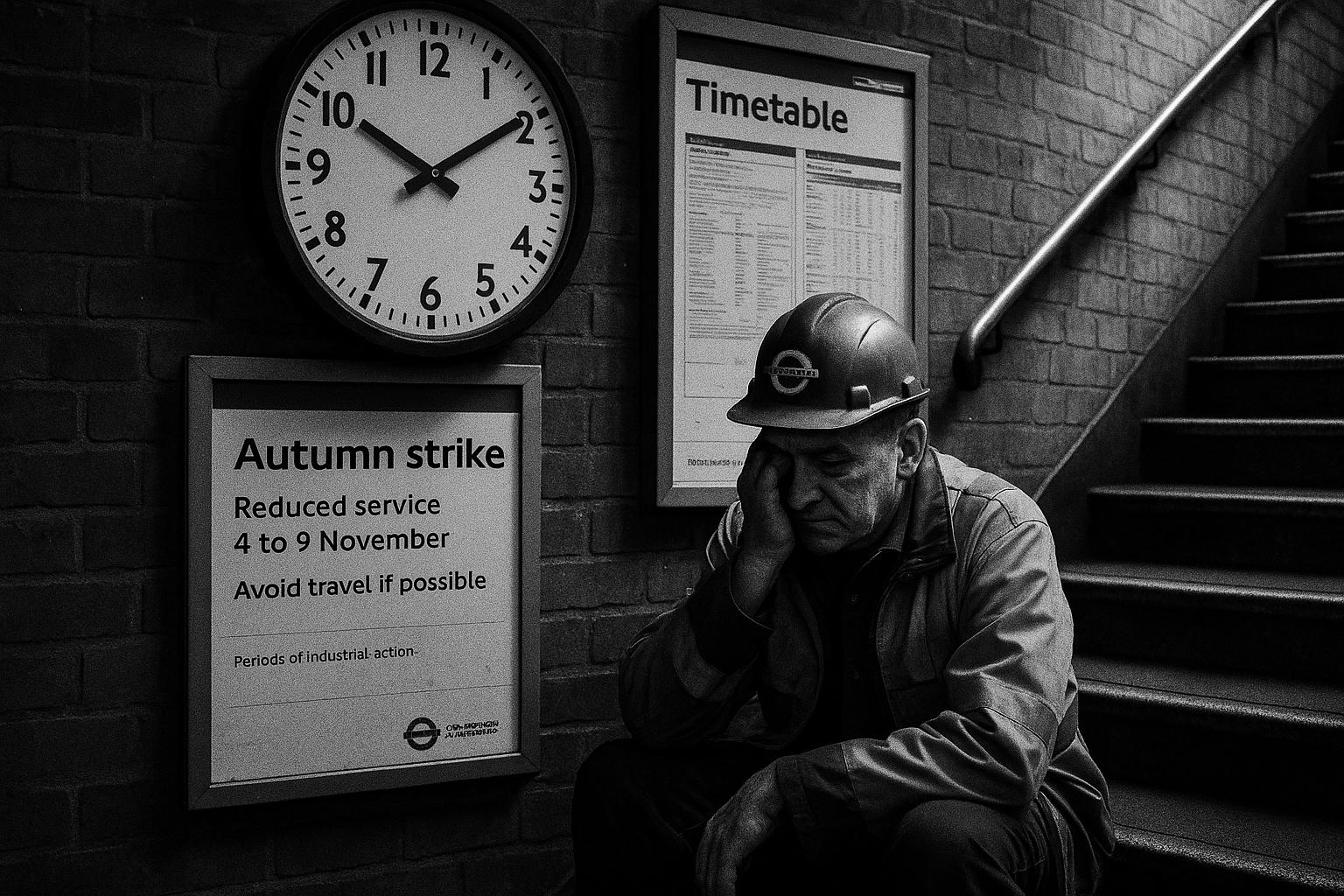Britain is bracing for an autumn of discontent as the country’s transport network and public services face a fresh wave of industrial action. The walkouts, led by the Rail, Maritime and Transport (RMT) union, are centred on pay, fatigue management and working patterns, with London Underground staff set to strike for a week from September 5, just as schools return and passenger numbers are expected to rise. The disruption is already shaping up as costly: analysts quoted by the Telegraph warn the strikes could cost the capital and its economy as much as £90 million per day, while economists caution the knock-on effects could ripple throughTfL, local businesses and road networks. The latest round of action sits against a backdrop of months of protests in Birmingham over pay cuts and working conditions, with Unite the Union mobilising against proposed changes to pay scales for council staff. In London, Mayor Sadiq Khan has urged both sides to sit down, insisting that nobody wants disruption for city residents. Health and political figures have signalled they expect a difficult autumn, with the government facing questions about how to fund pay settlements while keeping essential services running. Speaking to the Political Currency podcast, Health Secretary Wes Streeting said there is a “responsibility” to stand up to public sector pay demands and to remind departments that they cannot “do everything for everyone, everywhere, all at once,” a sentiment echoed as ministers seek to balance competing pressures facing households. The same weekend, the capital’s transport network was underscored by concerns about staffing and safety, with TfL stressing that drivers will not be in strike action but signalling that the breadth of industrial action could still bring multiple Underground lines to a standstill. The price tag of the disruption has already come into sharper relief as the year’s first half saw more than 280,000 working days lost to strikes, complicating what Keir Starmer has described as a bid to reset Britain’s politics and economy after years of disruption. The scale of the dispute has raised questions about whether the government’s fiscal plans—amid warnings of a sizable public finances gap—can accommodate substantial pay rises without widening austerity gaps.
Moving from the tube to broader financing questions, the dispute is entwined with debates over fair pay in the public sector and how much the exchequer can commit this year. The Telegraph has reported that strikers have pressed for special payments for working on Boxing Day and for a shorter working week, changes that some union leaders say would be essential for long‑term workforce sustainability. In London, the question of affordability is concrete: TfL has tabled a 3.4% pay rise offer, but a shorter working week—down from 35 hours to 34.5 hours—remains a burden the authority says is unaffordable within its current funding envelope. The union says fatigue and extreme shift rotations are pressing issues that have not been adequately addressed by management, even as drivers themselves earn well over £70,000 a year. As the debate intensifies, independent economists offer stark projections: one analyst warned the strikes could compress the city’s economy, while another suggested the cost to London could approach a quarter of a billion pounds in lost revenue to TfL and to local businesses, in addition to greater congestion and longer travel times for commuters. Against this backdrop, the government’s fiscal stance—while open to some settlements above inflation in principle—has remained cautious, with Labour emphasising prudent funding and sustainable reforms rather than “inflation-plus” promises that could widen the public finances gap.
Looking ahead, Reuters has outlined the logistics of the coming week of action: rolling seven‑day strikes beginning on September 5, with different grades walking out at staggered times across the Underground, and a DLR strike the following week. The objective, according to the agency, is to press for negotiated settlements around pay, fatigue management and rostering, rather than to cause disruption for its own sake. Transport for London says it remains engaged in talks and continues to stress affordability and meaningful engagement as it pursues safety and service reliability. On the political front, Guardian reporting points to a cautious stance from Labour’s leadership. Keir Starmer has warned that public finances are tight and that unions should brace for less generous settlements than in the past, a position aligned with the party’s broader expectation that settlements must be affordable and sustainable. This stance is echoed by Labour’s allies in public‑sector criticism of inflation‑busting pay rises, with economists and policymakers warning of the fiscal risks of aggressive pay deals. The evolving story remains unresolved as talks continue, with city workers, commuters and taxpayers watching closely for any signs of compromise.
Ultimately, the current stalemate underscores a broader, long‑running tension between the need to recruit and retain workers in essential public services and the imperative to keep public finances in check. The near‑term question is whether the parties can agree a package that recognises worker fatigue and public service pressures while delivering a credible, affordable path through the winter months. In the meantime, the capital waits to see how much chaos is tolerable and for how long, as the autumn forecast moves from a potential “autumn of chaos” to a more collaborative approach that could avert the worst outcomes.
📌 Reference Map:
Source: Noah Wire Services
